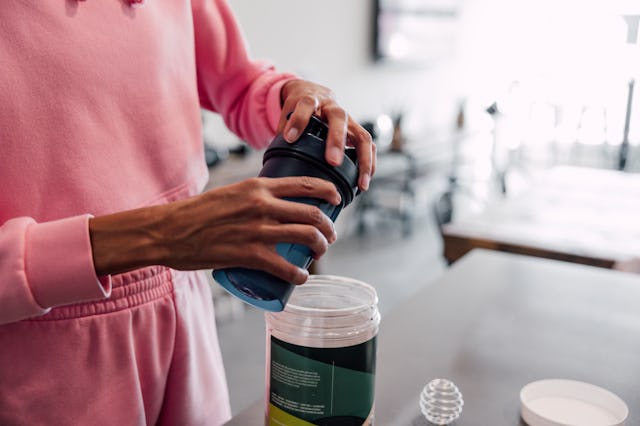Consumer Reports Investigation Finds Many Popular Protein Brands Contain High Levels Of Lead
Supplements aren’t regulated by the FDA, so there’s no legal limit to the amount of heavy metals protein powders and shakes can contain.

How much of your day do you spend thinking about protein now? For so many American families, meeting their daily protein intake has become a normal part of meal planning. And protein-forward substitutions — like protein pasta, protein waffles, and protein shakes instead of coffee creamer — are far more plentiful on store shelves than they were 15 years ago, according to Consumer Reports. What’s troubling: A new investigation by CR found that many popular protein powder and shake brands contain more lead in a serving “than CR’s food safety experts say is safe to consume in a day — some by more than 10 times.”
Consumer Reports first tested protein powders for heavy metals 15 years ago, when the supplements were far more niche. Apparently, the lead levels in these products have only gone up in that time. In today’s test, which examined 23 powders and shakes, the average level of lead was higher than it was 15 years ago, and some products had “nearly twice as much lead per serving as the worst product we analyzed in 2010.”
So, what else did they learn? You can read their full report and review the list of products they tested on their website, and we’ve got the highlights here.
The worst offenders on Consumer Reports' list tended to be plant-based proteins.
Consumer Reports set their “level of concern” for lead at 0.5 micrograms ingested per day. A 2019 analysis by the FDA found that most American adults are already exposed to 5.3 micrograms of lead each day in their diet, so ideally, your protein supplements would add no more (or very little) to that total. That’s because the FDA says children should not be exposed to more than 2.2 micrograms of lead per day, or 8.8 micrograms for adults, according to CR.
“Nearly all the plant-based products CR tested had elevated lead levels... Two had so much lead that CR’s experts caution against using them at all,” writes Paris Martineau for Consumer Reports. Those two products are the Naked Nutrition Vegan Mass Gainer and the Huel Black Edition powder. “One serving of Naked Nutrition’s Mass Gainer contained 7.7 micrograms of lead, and a single serving of Huel’s Black Edition contained 6.3 micrograms.”
In a statement, Naked Nutrition said that their mass gainer has a significantly larger serving size compared to standard protein powders, but that per gram it did not contain more lead than the other products CR analyzed. They submitted the product for independent third-party testing “which confirmed that no heavy metals exceeded FDA reference intake levels for adults, including for sensitive groups such as women of childbearing age.”
The plant-based proteins CR tested all list pea protein as their main ingredient. The outlet explained that plants are “particularly susceptible” to absorbing lead via the soil, air, and water. Lead can occur naturally in the environment or as a result of contamination from pollution. The lead could also be entering the pea protein during the manufacturing process.
This is still a problem because supplements aren’t regulated the same way as medications.
Unlike over-the-counter and prescription medications, the U.S. Food and Drug Administration does not regulate vitamins or supplements, like protein powder or shakes, before they’re sold. This means no safety testing or samples taken to check for heavy metal contamination. There is no legal limit on the amount of lead allowed in protein powders, and no laws about removing products from the marketplace, even when high levels of contaminants are found.
Experts say we don’t need to worry so much about protein, and we definitely shouldn’t expose ourselves to lead to get more of it.
Consumer Reports spoke with numerous physicians and researchers who agree that Americans think we need far more protein than we actually do, and that we can easily meet our goals through food without using protein supplements. While online influencers have popularized the idea that we need one zillion grams of protein per day (I’m paraphrasing), government nutritional guidelines maintain that the average healthy adult needs roughly 0.8 grams of protein per kilogram of body weight.
The report also noted that your body can really only absorb so much protein per meal — roughly 25 to 30 grams. Consistent overconsumption of protein can actually teach your body to waste more of it, meaning you now have to consume even more to get the same benefit you might have had before, according to Nicholas Burd, PhD, a professor of health and kinesiology at the University of Illinois Urbana-Champaign.
Ultimately, the safety experts at Consumer Reports say that because there’s not good federal oversight of supplements, consumers have to be aware of the risks of protein supplements and shop wisely themselves. They advise choosing whole foods over protein shakes and using the USDA daily intake calculator to determine how much protein you really, truly need. If you’re going to continue drinking shakes, their experts say to check for lead test results online before purchasing a protein product. If there are none available, try to opt for animal-based proteins over plant-based ones.
This article was originally published on